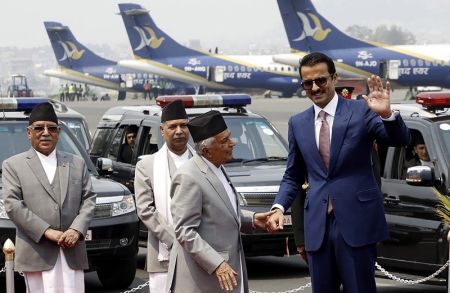 By Dr Rabindra Karna
By Dr Rabindra Karna Most people want to feel proud about their work and feel better for having performed to the satisfaction of business needs. While accepting assignments, projects or jobs they do so with with the sense of ownership. These are really professional people. They deal with others with a clear understanding of interdependence and give due consideration and respect to other departments, sections or functions.
Â
Job ownership by an employee plays crucial role for business success in today’s competitive global market. Businesses need continued progress in product development. Unless the people take this responsibility of product development with the sense of ownership, they will not put into it their full knowledge and experience and efforts. As a result, competitive advantage benefits will keep missing for all stake holders: the employee, the company, the customers and the investors.
Â
Anything consistently continued for a longer period will certainly convert into guaranteed success. Though many management scientists argue that ’success in the life is not difficult to achieve’, continuous move towards the destination is essential to achieve success. Money has never been the highest motivating factor for human resources at a work place. The most common motivators are security, work-life balance, efficiency, learning opportunity and recognition against efforts one puts for business success.
Â
Simultaneously, the most acknowledged motivator for business owners or investors is emotional attachment. Success and failure are mostly immaterial for them because failure is considered the only way to learn, in business. The challenge for them is not the knowledge but the work ethics, values and consistency to get results. This is called ownership mentality and the same applies for employees with job ownership attitude.
Â
 During recruitment phase, interviews are mostly centred on prospective and anticipated relationships. The standard contract is imposed on the employee as soon as an agreement is reached. However, it mostly escapes ’detailing position and job profile’. The fact remains that the actual rights and duties of employees emerge through interpersonal relationships built at the workplace during the course of working together. Hence, psychological contract becomes eminent to match one another’s expectations contributing to higher level of performance and satisfaction. As long as common understanding and agreement in respect to the business mission, values, loyalty and respect exists between an employee and the employer, trust and commitment remain ensured. The relationship, if managed efficiently and effectively, will tie a stronger knot of mutual trust between the employer and employee matching the objectives and commitments necessary for business prosperity. In case it turns negative, it may result in disenchantment, de-motivation and resentfulness of authoritarianism within the organisation resulting in inefficient work, internal units not corresponding to the mission and objectives of the organisation and much more.
During recruitment phase, interviews are mostly centred on prospective and anticipated relationships. The standard contract is imposed on the employee as soon as an agreement is reached. However, it mostly escapes ’detailing position and job profile’. The fact remains that the actual rights and duties of employees emerge through interpersonal relationships built at the workplace during the course of working together. Hence, psychological contract becomes eminent to match one another’s expectations contributing to higher level of performance and satisfaction. As long as common understanding and agreement in respect to the business mission, values, loyalty and respect exists between an employee and the employer, trust and commitment remain ensured. The relationship, if managed efficiently and effectively, will tie a stronger knot of mutual trust between the employer and employee matching the objectives and commitments necessary for business prosperity. In case it turns negative, it may result in disenchantment, de-motivation and resentfulness of authoritarianism within the organisation resulting in inefficient work, internal units not corresponding to the mission and objectives of the organisation and much more. Â
The words ’employees’ or ’Staff’, to the extent of psychological contract, signify:
Employers’ behaviour and dealing with employees
Employees’ input to the job they are entrusted or hired for
Respect, trust, fairness and objectivity are equally important in a job because job holders like these are essential for a civilised society in general. From a wider perspective, these become complex and significant at workplace and especially in management practices mainly towards ’change management’.
Â
The employer and employee relationship has grown in complexity with the emergence or growth of globalised skills market allowing very high mobility of people resources. Leadership is basically seen as representing the organisation and that reflects the aim and purposes of the organisation owners. Leadership in this context refers to the top management associates like Business Head, CEO etc. The nature of the relationship in transactional analysis is different to one that is limited to employee and employer. However, it’s significant in terms of agreeing on mutual transparent expectations. Further, the management and organisational principles heavily depend on fair and balanced understandings between the employer and employee.
Â
People’s lives have become more varied, informed and better placed in recent days with the achievement of rapid growth by many economies. Human capital around the globe is equipped more with high awareness and hence, it not only wants more but also deserves more. Therefore, the employees naturally expect greater fulfilment in return for their services or association. The work itself has become far more richly diverse and complicated than ever before.
Â
There is an increased excitement in the work place these days. The excitement is because of the application of different business model named ’employee ownership’ in corporations and cooperatives wherein employees and potentially the customers own the organisation and can therefore represent management mechanism. We see and experience glimpses here possibly as to how organisations might be run more fairly and sustainably in days to come. Globalisation and technology in recent days have shifted everything we knew in relation to organised work onto a totally different level in terms of complexity, rate of change, connectivity and the mobility of human resources and activities.
Â
Thus, if organisations truly want to make innovations, creating and encouraging job ownership is the key. This ownership is the investment from both the company (funding, balanced work culture) and the employee (time, knowledge, commitment) by allowing and generating acceptance as well as securing achievement towards personal responsibility for products, processes and different stakeholders involved with the organisation. Job ownership reflects business understanding in view of culture, goal, and customers etc facilitating interactions with various elements widely known as interpersonal skills. It forces people to display a selfless attitude ensuring and delivering not only acceptable but better, improved and acknowledgeable productivity.
Â
Getting people to think and act like owners has never been easy and hence, if employees accept and take up jobs considering themselves as owners, it must be considered a great achievement. Employees are motivated further in view of sustainability onto business expectations. Involving employees in decision making requires entrepreneurs to seek input from employees and must listen to them. The solution really lies in making them part of decision making.
Â
Ultimately, it’s all about people and taking care of people resources for better productivity in terms of business sustainability. Promoting job ownership and acceptance in the true sense will certainly guarantee the realisation of organisational mission, goal and objectives.
(Dr Karna is the Executive Chairman of MARK Business Solutions Pvt Ltd and Ad Abhyas Marketing & Communications Pvt Ltd. The article is based on various research reports and his practical experiences as management practitioner.)






















